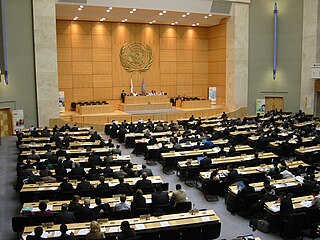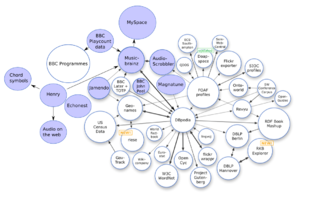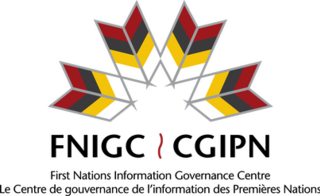Related Research Articles

Environmental laws are laws that protect the environment. Environmental law is the collection of laws, regulations, agreements and common law that governs how humans interact with their environment. This includes environmental regulations; laws governing management of natural resources, such as forests, minerals, or fisheries; and related topics such as environmental impact assessments.Environmental law is seen as the body of laws concerned with the protection of living things from the harm that human activity may immediately or eventually cause to them or their species, either directly or to the media and the habits on which they depend.

The Internet Corporation for Assigned Names and Numbers is an American multistakeholder group and nonprofit organization responsible for coordinating the maintenance and procedures of several databases related to the namespaces and numerical spaces of the Internet, ensuring the network's stable and secure operation. ICANN performs the actual technical maintenance work of the Central Internet Address pools and DNS root zone registries pursuant to the Internet Assigned Numbers Authority (IANA) function contract. The contract regarding the IANA stewardship functions between ICANN and the National Telecommunications and Information Administration (NTIA) of the United States Department of Commerce ended on October 1, 2016, formally transitioning the functions to the global multistakeholder community.

The right of a people to self-determination is a cardinal principle in modern international law, binding, as such, on the United Nations as authoritative interpretation of the Charter's norms. It states that peoples, based on respect for the principle of equal rights and fair equality of opportunity, have the right to freely choose their sovereignty and international political status with no interference.
Corporate governance are mechanisms, processes and relations by which corporations are controlled and operated ("governed").

The World Summit on the Information Society (WSIS) was a two-phase United Nations-sponsored summit on information, communication and, in broad terms, the information society that took place in 2003 in Geneva and in 2005 in Tunis. WSIS Forums have taken place periodically since then. One of the Summit's chief aims is to bridge the global digital divide separating rich countries from poor countries by increasing internet accessibility in the developing world. The conferences established 17 May as World Information Society Day.
Governance is the process of making and enforcing decisions within an organization or society. It is the process of interactions through the laws, social norms, power or language as structured in communication of an organized society over a social system. It is done by the government of a state, by a market, or by a network. It is the process of choosing the right course among the actors involved in a collective problem that leads to the creation, reinforcement, or reproduction of acceptable conduct and social order". In lay terms, it could be described as the political processes that exist in and between formal institutions.
Global governance refers to institutions that coordinate the behavior of transnational actors, facilitate cooperation, resolve disputes, and alleviate collective action problems. Global governance broadly entails making, monitoring, and enforcing rules. Within global governance, a variety of types of actors – not just states – exercise power. Governance is thus broader than government.

Internet governance consists of a system of laws, rules, policies and practices that dictate how its board members manage and oversee the affairs of any internet related-regulatory body. This article describes how the Internet was and is currently governed, some inherent controversies, and ongoing debates regarding how and why the Internet should or should not be governed in future.
Public participation, also known as citizen participation or patient and public involvement, is the inclusion of the public in the activities of any organization or project. Public participation is similar to but more inclusive than stakeholder engagement.

Open data is data that is openly accessible, exploitable, editable and shared by anyone for any purpose. Open data is licensed under an open license.
The Stockholm Declaration of 1972, or the Declaration of the United Nations Conference on the Human Environment, is the first United Nations declaration on the global environment. It consists of 26 principles and led to the creation of the United Nations Environment Programme (UNEP), which laid the foundation for future global environmental governance. The United Nations Conference on the Human Environment was held in Stockholm, Sweden, from June 5–16 in 1972. The 1972 United Nations Conference on the Human Environment signifies the first international effort to place environmental issues at the forefront of global concerns. The Conference sought to recognize the finite nature of Earth's resources and human impacts on the environment. It represented the beginning of a global dialogue on the link between economic growth, the pollution of the environment, and the well-being of humanity. The resulting Stockholm Declaration urged its partnering nations to reduce air, land, and water degradation by integrating science and technology in their development plans. It also called nations to create regulations on wildlife protection, environmental conservation, and population control. While the reception of the ideas in the Declaration generally stayed positive, it received wide criticisms on its practical implementation, especially from developing nations.
Soil governance refers to the policies, strategies, and the processes of decision-making employed by nation states and local governments regarding the use of soil. Globally, governance of the soil has been limited to an agricultural perspective due to increased food insecurity from the most populated regions on earth. The Global Soil Partnership, GSP, was initiated by the Food and Agriculture Organization (FAO) and its members with the hope to improve governance of the limited soil resources of the planet in order to guarantee healthy and productive soils for a food-secure world, as well as support other essential ecosystem services.
The digital commons are a form of commons involving the distribution and communal ownership of informational resources and technology. Resources are typically designed to be used by the community by which they are created.
Data sovereignty is the idea that data are subject to the laws and governance structures of the nation where they are collected. The concept of data sovereignty is closely linked with data security, cloud computing, network sovereignty and technological sovereignty. Unlike technological sovereignty, which is vaguely defined and can be used as an umbrella term in policymaking, data sovereignty is specifically concerned with questions surrounding the data itself. Data sovereignty as the idea that data is subject to the laws and governance structures within one nation is usually discussed in two ways: in relation to Indigenous groups and Indigenous autonomy from post-colonial states or in relation to transnational data flow. With the rise of cloud computing, many countries have passed various laws around the control and storage of data, which all reflect measures of data sovereignty. More than 100 countries have some sort of data sovereignty laws in place. With self-sovereign identity (SSI) the individual identity holders can fully create and control their credentials, although a nation can still issue a digital identity in that paradigm.

FAIR data are data which meet principles of findability, accessibility, interoperability, and reusability (FAIR). The acronym and principles were defined in a March 2016 paper in the journal Scientific Data by a consortium of scientists and organizations.

The First Nations Information Governance Centre (FNIGC) is an Ontario, Canada-based non-profit organization working in the field of First Nations data sovereignty. The organization is known for its comprehensive national surveys, which include the First Nations Regional Health Survey (FNRHS), and focus on the health and socio-economic conditions of First Nations people in Canada.
Digital self-determination is a multidisciplinary concept derived from the legal concept of self-determination and applied to the digital sphere, to address the unique challenges to individual and collective agency and autonomy arising with increasing digitalization of many aspects of society and daily life.
Indigenous librarianship is a distinct field of librarianship that brings Indigenous approaches to areas such as knowledge organization, collection development, library and information services, language and cultural practices, and education. The Encyclopedia of Library and Information Sciences states that Indigenous librarianship emerged as a "distinct field of practice and an arena for international scholarship in the late twentieth century bolstered by a global recognition of the value and vulnerability of Indigenous knowledge systems, and of the right of Indigenous peoples to control them."
The African Declaration on Internet Rights and Freedoms (AfDec) has been created in order to promote an Internet environment that conforms to established human rights standards and meets Africa's social and economic development needs. The Declaration was agreed on at the 2013 African Internet Governance Forum (AfIGF) in Nairobi, Kenya and launched in 2014 at the global Internet Governance Forum in Istanbul, Turkey. It provides a normative framework on which basis recommendations for policy and legislative processes on internet rights, freedoms and governance in Africa are made. They can be applied at national, sub-regional and regional levels.
Data governance in the context of Indigenous data involves supporting the data interests, gaps and priorities of Indigenous peoples, in order to enable Indigenous self-determination. Generally, data governance refers to who has ownership, control and access over the use of data. Indigenous data governance requires the data to surround Indigenous peoples and its purpose to reflect Indigenous needs and priorities, rather than omitting Indigenous peoples in the production of Indigenous data.
References
- 1 2 3 Alberta First Nations Information Governance Centre (May 2014). "Ownership, Control, Access, and Possession" (PDF): 2.
{{cite journal}}: Cite journal requires|journal=(help) - 1 2 3 Alberta First Nations Information Governance Centre (May 2014). "Ownership, Control, Access, and Possession" (PDF): 3.
{{cite journal}}: Cite journal requires|journal=(help) - 1 2 3 The First Nations Information Governance Centre (2019). "First Nations data sovereignty in Canada". Statistical Journal of the IAOS. 35 (1): 64. doi: 10.3233/SJI-180478 . ISSN 1874-7655. S2CID 241953288.
- 1 2 Halseth, Greg; Markey, Sean; Ryser, Laura; Manson, Don (2016-06-01). Doing Community-Based Research: Perspectives from the Field. Quebec: McGill-Queen's Press - MQUP. p. 73. ISBN 978-0-7735-9923-9.
- ↑ First Nations Health Managers Association (2013). "Understanding the Basics of OCAP". FNHMA Publications: 1.
- 1 2 3 4 Sixsmith, Andrew; Sixsmith, Judith; Mihailidis, Alex; Fang, Mei Lan (2020-12-22). Knowledge, Innovation, and Impact: A Guide for the Engaged Health Researcher. Switzerland: Springer Nature. p. 370. ISBN 978-3-030-34390-3.
- 1 2 3 4 First Nations Health Managers Association (2013). "Understanding the Basics of OCAP". FNHMA Publications: 2.
- ↑ Daly, Angela; Devitt, S. Kate; Mann, Monique (2019). Good Data. Theory on Demand #29. Amsterdam: Institute of Network Cultures. p. 34. ISBN 978-94-92302-27-4.
- ↑ Atleo, Shawn A-in-chut (Dec 2009). "First Nations Information Governance Stand Alone Centre" (PDF). Assembly of First Nations Special Chiefs Assembly (48).
- ↑ First Nations Information Governance Centre (2023). "About". First Nations Information Governance Centre. Retrieved 15 May 2023.